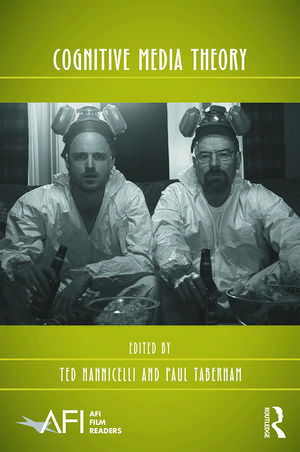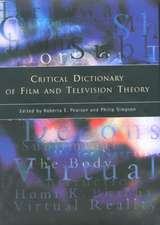Cognitive Media Theory
Editat de Ted Nannicelli, Paul Taberhamen Limba Engleză Paperback – 18 mar 2014
| Toate formatele și edițiile | Preț | Express |
|---|---|---|
| Paperback (1) | 487.20 lei 6-8 săpt. | |
| Taylor & Francis – 18 mar 2014 | 487.20 lei 6-8 săpt. | |
| Hardback (1) | 1115.51 lei 6-8 săpt. | |
| Taylor & Francis – 24 apr 2014 | 1115.51 lei 6-8 săpt. |
Preț: 487.20 lei
Nou
Puncte Express: 731
Preț estimativ în valută:
93.24€ • 96.98$ • 76.97£
93.24€ • 96.98$ • 76.97£
Carte tipărită la comandă
Livrare economică 12-26 aprilie
Preluare comenzi: 021 569.72.76
Specificații
ISBN-13: 9780415629874
ISBN-10: 041562987X
Pagini: 358
Ilustrații: 5 black & white tables, 25 black & white halftones
Dimensiuni: 152 x 229 x 23 mm
Greutate: 0.57 kg
Ediția:New.
Editura: Taylor & Francis
Colecția Routledge
Locul publicării:Oxford, United Kingdom
ISBN-10: 041562987X
Pagini: 358
Ilustrații: 5 black & white tables, 25 black & white halftones
Dimensiuni: 152 x 229 x 23 mm
Greutate: 0.57 kg
Ediția:New.
Editura: Taylor & Francis
Colecția Routledge
Locul publicării:Oxford, United Kingdom
Public țintă
Postgraduate and UndergraduateCuprins
1. Introduction: Contemporary Cognitive Media Theory Ted Nannicelli and Paul Taberham Part I: The State of Cognitive Media Theory: Current Views and Issues 2. The Pit of Naturalism: Neuroscience and the Naturalized Aesthetics of Film Murray Smith 3. Evolutionary Film Theory Malcolm Turvey 4. The Geography of Film Viewing: What Are the Implications of Cultural-Cognitive Differences for Cognitive Film Theory? Daniel Barratt Part II: Psychological Research and Media Theory 5. Audiovisual Correspondences in Sergei Eisenstein’s Alexander Nevsky: A Case Study in Viewer Attention Tim J. Smith 6. Engaged and Detached Film Viewing: Exploring Film Viewers’ Emotional Action Readiness Ed S. Tan 7. Coloring the Animated World: Exploring Human Color Perception and Preference through the Animated Film Kaitlin L. Brunick and James E. Cutting Part III: Cognitive Theory and Media Content 8. Mood and Ethics in Narrative Film Carl Plantinga 9. Effects of Entertaining Violence: A Critical Overview of the General Aggression Model Dirk Eitzen 10. A General Theory of Comic Entertainment: Arousal, Appraisal, and the PECMA Flow Torben Grodal 11. Postcolonial Humor, Attachment, and Yasujiro Ozu’s Early Summer Patrick Colm Hogan 12. Avant-Garde Film in an Evolutionary Context Paul Taberham Part IV: Cognitive Theory and Media Forms 13. Cognitive Theory and the Individual Film: The Case of Rear Window William Seeley and Noël Carroll 14. Cognitive Theory and Video Games Andreas Gregersen 15. Blinded by Familiarity: Partiality, Morality and Engagement with Television Series Margrethe Bruun Vaage 16. Coming Out of the Corner: The Challenges of a Broader Media Cognitivism Greg M. Smith
Notă biografică
Ted Nannicelli is Lecturer in Film and Television Studies in the School of English, Media Studies, and Art History at the University of Queensland, Australia. He is the author of A Philosophy of the Screenplay.
Paul Taberham is Lecturer in Animation Studies at Arts University Bournemouth. He has published in Projections: The Journal for Movies and Mind, Animation Journal and The Routledge Encyclopedia of Film Theory.
Paul Taberham is Lecturer in Animation Studies at Arts University Bournemouth. He has published in Projections: The Journal for Movies and Mind, Animation Journal and The Routledge Encyclopedia of Film Theory.
Descriere
Across the academy, scholars are debating the question of what bearing scientific inquiry has upon the humanities. The latest addition to the AFI Film Readers series, Cognitive Media Theory takes up this question in the context of film and media studies. This collection of essays by internationally recognized researchers in film and media studies, psychology, and philosophy offers film and media scholars and advanced students an introduction to contemporary cognitive media theory—an approach to the study of diverse media forms and content that draws upon both the methods and explanations of the sciences and the humanities. Exploring topics that range from color perception to the moral appraisal of characters to our interactive engagement with videogames, Cognitive Media Theory showcases the richness and diversity of cognitivist research. This volume will be of interest not only to students and scholars of film and media, but to anyone interested in the possibility of a productive relationship between the sciences and humanities.














